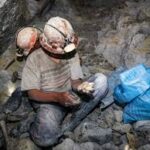A new United Nations Group of Experts report has presented damning evidence linking Rwanda to the recent advances made by the M23 rebel group in the eastern Democratic Republic of Congo (DRC), contradicting earlier denials by President Paul Kagame. The report outlines that Rwanda exercised significant command and control over M23, providing the rebels with military orders, training, and advanced weaponry, including anti-aircraft systems.
The findings allege that approximately 6,000 Rwandan soldiers were stationed in key conflict zones in North and South Kivu, actively supporting M23 offensives that led to the seizure of major cities, including Goma and Bukavu. The report also accuses Rwanda of violating UN arms embargoes and being responsible for a deadly missile strike that targeted UN peacekeepers earlier this year.
These revelations arrive as the international community ramps up efforts to de-escalate one of Africa’s most complex and deadly conflicts. The war has displaced over 4 million people and left thousands dead, while worsening the humanitarian crisis in mineral-rich eastern Congo.
UN investigators documented serious human rights violations attributed to both sides in the conflict. M23 fighters, reportedly backed by Rwanda, have been accused of ethnic cleansing, forced recruitment of children, and systematic sexual violence. On the other hand, Congo’s national army faces accusations of indiscriminate shelling and the death of countless civilians since the war escalated.
Despite Rwanda’s insistence that its actions are aimed at neutralizing threats from armed Hutu groups based in the DRC, including remnants of the FDLR, critics argue that the true motive lies in Rwanda’s interest in the region’s lucrative natural resources.
The report’s findings have already begun influencing international diplomacy. A UN Security Council resolution passed in February demanded an immediate ceasefire and full withdrawal of foreign troops from Congolese territory. Meanwhile, recent diplomatic meetings brokered by the U.S. and Qatar aim to map out a peace framework, with hopes of resuming stalled talks between the warring parties.
While Rwanda denies the UN allegations and criticizes the report as one-sided, the evidence suggests that M23’s military successes would not have been possible without direct foreign military support.
As the conflict continues to destabilize the region, international actors are now calling for urgent accountability, greater humanitarian intervention, and renewed pressure on both Rwanda and Congo to commit to a lasting peace agreement.













Leave a comment